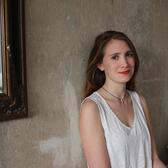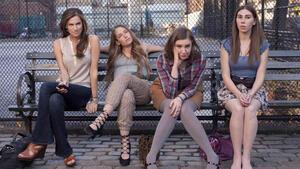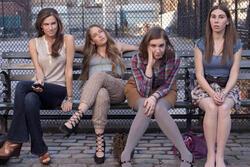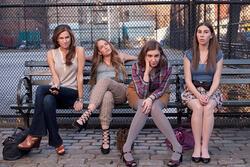A Voice of A Generation: Goodbye, Girls!
Like apparently everyone else in the world, we at JWA had some thoughts about the series finale of Girls. Two of our staffers, Emily Cataneo and Elena Hoffenberg, both millennials, feminists, and fans of the show, sat down and chatted about Girls, its legacy, and the best way to end a show about young women.
This conversation is also the fourth installment in our Reading Our Rights series.
EMILY: So. After six years, Girls wrapped up last month. You started watching when you were seventeen. Seventeen! What was your relationship to the show as you grew up alongside it?
ELENA: Girls started when I was in my senior year of high school. I had just gotten back from my very first trip by myself to NY, during which I ran around the city with my friends and we had our own shenanigans (nowhere near what Hannah et al. do in any season of Girls, just in case you're reading this, Mom!) To me, Girls showed what I could aspire to when I graduated college and moved to New York and hung out with all of my friends and had a job and a passion that were not one and the same and a crappy apartment, etc. I saw some of my earliest and most explicit sex on a television show in Girls. I would read praise for how Girls portrayed sex as realistic in its awkwardness, and not having any experience of my own to draw on, what I saw on the show had an impact! Now, as I'm a year out of college and approaching where the characters were in the first season, I'm grateful my life isn't as crazy as theirs, but the show continues to provide reference points.
How was watching Girls for you, both as someone closer in age to the characters and as someone who is a writer?
EMILY: I was pretty much always the same age as the girls: the show started when I was 23. It was gratifying and validating to see characters on TV who made the same kinds of messy decisions as my peers. I can't say my life was as crazy as theirs, but there were definitely some special crazy moments, and having them there as reflections was both validating and a little maddening. I especially related to Hannah's zeal for making dumb decisions to fuel her writing: I may have invoked that same zeal to justify some of my own decisions at that age. However, as a writer, it was sometimes frustrating when Hannah would have some opportunity handed to her, thus distorting people's perspective on how hard it is to be a writer.
(HANNAH WOULD NOT HAVE GOTTEN INTO IOWA WRITERS WORKSHOP)
(JUST SAYIN’).
ELENA: Well, some people say that Hannah's success on the show is a form of wish fulfillment for Lena Dunham. That's something people have been talking about throughout the course of the show: the line between Lena and Hannah. Thoughts?
EMILY: I've tried to resist viewing them as one and the same, because it does drive me crazy when people automatically assume that women's art is memoir. What about you?
ELENA: I think it changed over time for me. The life of a college-educated white woman in New York City was pretty glamorous to me in those days. Anything I heard Lena Dunham say about the show and a time in her life that inspired a certain situation made the show more compelling. But in the later seasons, I guess it became clearer to me that Lena's life was not Hannah's life.
But one aspect of Lena Dunham that leaked through to Hannah was her Jewishness. I think her identification as Jewish and the identification of her characters as Jewish was a powerful thing! Sure, there have been Jewish characters on TV before, but placing them at the center of a TV show felt new to me. Certain lines were specific enough to show that someone in the writing room knew their stuff. For example, when Shosh has a big sexual first in the first season, it's with someone who went to Camp Ramah, the Jewish Conservative Movement summer camp. He doesn't just say "summer camp" and it's understood as Jewish, or "Jewish summer camp," but it's "Camp Ramah." Seeing that on TV––especially as someone who recognized summer camp as the ultimate tool in a game of Jewish geography––was amazing to me.
EMILY: There was so much that felt fresh and new about the show. But let's talk about something that didn't: the finale. What did you think of it?
ELENA: It was a little disappointing. One of my favorite parts of Girls was the characters and how they interacted with one another, but I guess it make sense to have it finish with Hannah?
EMILY:I think the show should have ended after Episode 9, in which the four girls have their final reckoning. That moment felt emotionally satisfying to me, as well as a sign that the girls were finally maturing––a fitting place to end. Hannah and her baby, though? To be honest, I HATED that plotline: just the fact that it existed rankled me. Their choice to emphasize it in the show's finale was just icing on my cake of rage and disappointment.
ELENA: Oh definitely, definitely.
But the pregnancy plot.
Is it too convenient as a way to end a TV show about young women??
EMILY: It's WAY too convenient. That's what I hated about it. For too long we have treated having children as the end game for women, the stamp of approval that proves their maturity–or even proves their worth! Girls radically expanded the conversation, and the possibilities, by exploring millennial sex, drug use, quasi-relationships, friendships, and female bodies. This pregnancy plot line was both narratively stale AND politically problematic.
ELENA: And it doesn't help that it seems to argue that pregnancy is kind of a consequence of her lifestyle. She gets pregnant after a drunken sexual encounter with a surf instructor (she barfs on his bed); the doctor who reveals to her that she's pregnant conveniently happens to be someone with whom she had sex in an earlier season.
EMILY: And yet some Internet commentators have painted Hannah's decision to raise her child as a clear and definitive sign of her maturity, an unquestionably laudable choice. Do you see it that way?
ELENA: I don't think any choice is always laudable and mature, nor is it un-laudable and immature.
With Hannah's life––her living situation, her age, her employment status, her financial situation, her lifestyle, her support networks, her relationship (or lack thereof) with the child's father––it made sense in the grand scheme of the TV show for her to keep the baby. I know this runs the risk of sounding like a total relativist (all choices are equal! anyone should be able to decide to do anything!), so let me qualify it:
We're meant to understand that of course she could have gotten an abortion if she decided that was right and of course she would have been able to support the child if she chose to carry the pregnancy to term. But the example set in TV shows is still powerful! What do you think of her choice?
EMILY: I think that's an important point: Hannah's choice doesn't seem constrained by practical concerns (we never worry that Hannah wouldn't be able to get an abortion if she wanted to). I also think it's important to note that if we were talking about my friend or something, a real woman, who got unexpectedly pregnant, I would support her whatever she chose. BUT Hannah Horvath is a fictional character, which means that someone made the choice to write her ending as pregnancy and childbirth. And I take exception to that choice.
ELENA: It's one thing to acknowledge that all women should have the choice, but the idea that women are supposed to always be prepared with an answer for what decision they would make in such a situation is, in some ways, a burden, right?
One powerful thing about art––whether literature or TV––is that it provides us with characters that are not our friends and not "real women" with whom we have relationships. Hannah Horvath gives us enough removal from our own friends that we can weigh in on her choices, but she remains similar enough to be identifiable. Some of the scenes in Girls felt like they came out of my life, word for word. And this is one of the powerful things about TV showing the lives of women who face unplanned pregnancies and make choices! A variety of choices!!
EMILY: And I wish that Lena and Co. had shown Hannah making a different choice.
ELENA: What choice would you have rather seen her make?
EMILY: If I had my druthers, I would have liked to see the writers’ room make the decision to axe the pregnancy plotline in the first place. But if they HAD to show an unplanned pregnancy, I would have liked to see Hannah have an abortion. Although abortion is becoming less taboo on TV, that's a recent phenomenon, and we need more examples of characters making this decision (after all, 1/3 of American women will have an abortion in their lifetime).
ELENA: I forget now, does the show even say "abortion"?
EMILY: I don't think it does. I think the doctor says to her, "we can find someone to take care of it for you" or some 1950s BS like that.
ELENA: That seems significant, too! It's continuing to treat it as a taboo subject, not as a true part of the lived experience of, as you said, 1 in 3 women in the United States. Lena Dunham has said she wished she had an abortion. Does that change how you view this plot on Girls?
EMILY It makes me surprised that she wrote this plotline at all. I'm really left scratching my head, to be honest: why do you think she decided to write the ending this way? Is this the influence of Judd "Knocked Up" Apatow?
ELENA: Maybe! I know, from the post-episode discussions on HBO with Lena Dunham, Judd Apatow, and Jenni Konner, that Apatow and Konner both looked to their own lives (they each have two children) for inspiration for this season, and especially the closing episode to find the most frustrating thing that Hannah could face as a new parent.
Maybe this speaks to the growing influence of women as showrunners––more storylines about raising children!
EMILY: And that's always a positive thing. Women as showrunners, that is.
ELENA: At any rate, for better or for worse, Hannah got her baby to latch, and the show ended. How do you think it will be remembered in five years?
EMILY: I think Girls will age well. If we continue to see more and more shows about young women and their shenanigans, then Girls will cease to be held up as THE show of its generation and will cease to be scrutinized as such.
ELENA: I agree completely. I think we'll be able to look back at Girls for what it was––a show that started the conversation, but definitely was not the end of it. We're already seeing how Girls is becoming just “A voice of A generation.” HBO just started a new show Insecure, which features Issa Rae of the web series Awkward Black Girl. It may be easy to draw parallels between her show and Girls, but to call Insecure a Girls for women of color would be a huge disservice to what Issa Rae has created.
EMILY: Totally. There can be many shows, about many groups of women, that cover many experiences.
ELENA Yes! Agreed! So, great conversation, and now let's show how to end something without using pregnancy as a trope of women reaching maturity!
EMILY: Great idea.
ELENA: Or maybe like the writers of Girls, we can't think of any better way to end a piece of writing about/by young women.








